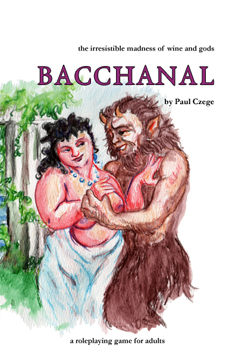I started to feel that I didn’t know roleplaying games well enough so I came up with the plan to read a roleplaying game corebook for every year they have been published. Selection criteria is whatever I find interesting.

The setting is the city of Puteoli, near Rome, in 61 A.D. The characters involved are citizens caught in the wine-drenched madness of Bacchus, satyrs and other gods. You seek to leave but you’ve lost your companion somewhere in the madness.
Bacchanal is a roleplaying game from the Forge era so its chief concern is determining who gets to describe scenes and events, based on which elements. There’s no GM and the game will run for a few hours.
The mechanics controlling narration are an interesting mix of functionality and theme. You have elements like wine glasses and a cheese tray to suggest the right atmosphere. Different dice represent wine, the gods or other elements and can be placed on the tray or in each player’s glasses. When you roll the dice in your wine glass, you’re trying to find out dominant elements. If the highest number rolled is of the die representing Venus, then Venus is important for the events you’ll narrate next.
Bacchanal belongs to the small subset of roleplaying games in which sex is a major element. The drunken, debauched people of the town are driven by lust. The booklet suggests starting with more moderate debauchery because if the first scene you narrate is the most extreme thing you can imagine, it’ll be difficult to escalate from there.
Given the debauched subject matter, it feels like the story-focused approach has a distancing effect, which may make it easier to go deep into depravity. Experience suggests that if the design of the game has a strong emphasis on emotional immersion into character, this type of play needs more in-game time to develop fully.